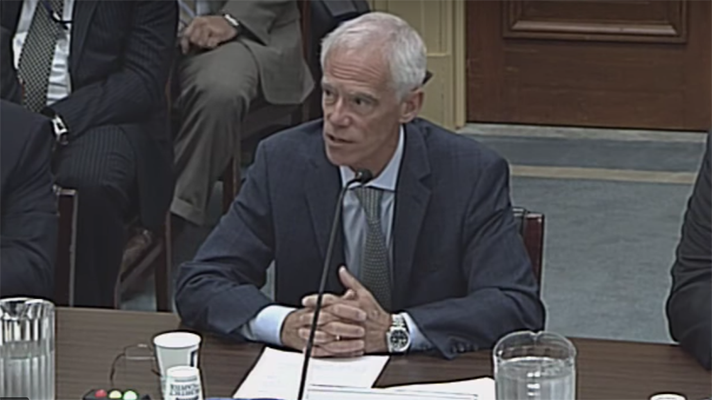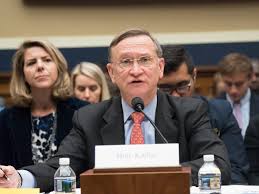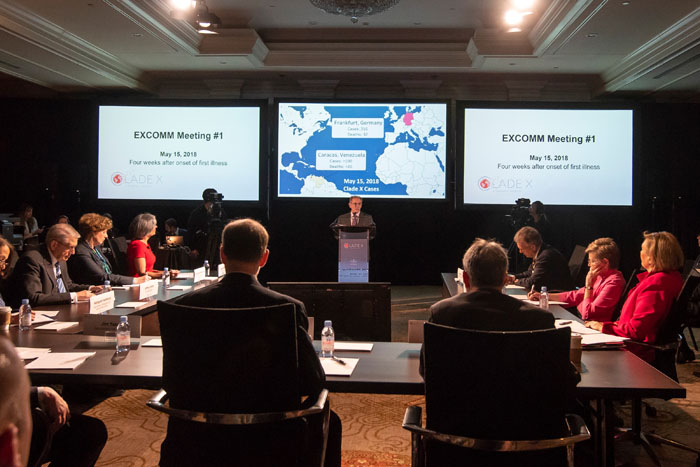Health Security
See the following -
Clade X pandemic exercise highlights policies needed to prevent or reduce the worst possible outcomes in future pandemics
 The outbreak of a moderately contagious and moderately lethal novel pathogen precipitated a catastrophic end to the scenario in Clade X, the day-long pandemic tabletop exercise hosted by the Johns Hopkins Center for Health Security on May 15 in Washington, DC. Clade X simulated a series of National Security Council–convened meetings of 10 US government leaders, played by individuals prominent in the fields of national security or epidemic response. Their dialogue as the scenario unfolded addressed significant uncertainties in current prevention and response capabilities, hamstrung by policy challenges at the federal level.
The outbreak of a moderately contagious and moderately lethal novel pathogen precipitated a catastrophic end to the scenario in Clade X, the day-long pandemic tabletop exercise hosted by the Johns Hopkins Center for Health Security on May 15 in Washington, DC. Clade X simulated a series of National Security Council–convened meetings of 10 US government leaders, played by individuals prominent in the fields of national security or epidemic response. Their dialogue as the scenario unfolded addressed significant uncertainties in current prevention and response capabilities, hamstrung by policy challenges at the federal level.
- Login to post comments
Health Organizations Implore Congress to Fund Public Health Surveillance Systems
 HLN Consulting joined more than eighty organizations, institutions, and companies in imploring Congress to fund public health surveillance systems. The appropriations request letters – one to the House and one to the Senate – seek one billion in funding over ten years (and $100 million in FY 2020) for the Centers for Disease Control and Prevention (CDC). This funding would allow CDC, state, local, tribal, and territorial health departments to move from sluggish, manual, paper-based data collection to seamless, automated, interoperable IT systems and to recruit and retain skilled data scientists to use them.
HLN Consulting joined more than eighty organizations, institutions, and companies in imploring Congress to fund public health surveillance systems. The appropriations request letters – one to the House and one to the Senate – seek one billion in funding over ten years (and $100 million in FY 2020) for the Centers for Disease Control and Prevention (CDC). This funding would allow CDC, state, local, tribal, and territorial health departments to move from sluggish, manual, paper-based data collection to seamless, automated, interoperable IT systems and to recruit and retain skilled data scientists to use them.
- Login to post comments
HHS cybersecurity center so unstable staff don't know if it exists, Congress argues
 The Senate HELP and House Energy and Committees are highly concerned about the U.S. Department of Health and Human Services’ cybersecurity plan, preparedness and the lack of leadership of its Healthcare Cybersecurity and Communications Integration Center -- and is demanding answers from HHS Secretary Alex Azar. The bipartisan letter to Azar outlines a laundry list of issues at HHS when it comes to its security plan. Among them, includes the temporary reassignment of two senior HCCIC officials in charge of the day-to-day operations.
The Senate HELP and House Energy and Committees are highly concerned about the U.S. Department of Health and Human Services’ cybersecurity plan, preparedness and the lack of leadership of its Healthcare Cybersecurity and Communications Integration Center -- and is demanding answers from HHS Secretary Alex Azar. The bipartisan letter to Azar outlines a laundry list of issues at HHS when it comes to its security plan. Among them, includes the temporary reassignment of two senior HCCIC officials in charge of the day-to-day operations.
- Login to post comments
Pandemic and all-hazards preparedness, response law emboldens U.S. disaster recovery efforts
 The Pandemic and All-Hazards Preparedness and Advancing (PAHPA) Innovation Act, S. 1379, became law on Monday with the president's signature, prompting accolades from national stakeholders, company executives and federal lawmakers. The far-reaching law ensures the United States will be better prepared to respond to a wide range of public health emergencies, whether man-made or occurring through a natural disaster or infectious disease. Overall, the law aims to bolster the nation's health security strategy, strengthen the country's emergency response workforce, prioritize a threat-based approach, and increase communication across the advanced research and development of medical countermeasures (MCMs), among numerous provisions contained in the law.
The Pandemic and All-Hazards Preparedness and Advancing (PAHPA) Innovation Act, S. 1379, became law on Monday with the president's signature, prompting accolades from national stakeholders, company executives and federal lawmakers. The far-reaching law ensures the United States will be better prepared to respond to a wide range of public health emergencies, whether man-made or occurring through a natural disaster or infectious disease. Overall, the law aims to bolster the nation's health security strategy, strengthen the country's emergency response workforce, prioritize a threat-based approach, and increase communication across the advanced research and development of medical countermeasures (MCMs), among numerous provisions contained in the law.
- Login to post comments
This mock pandemic killed 150 million people. Next time it might not be a drill
 A novel virus, moderately contagious and moderately lethal, has surfaced and is spreading rapidly around the globe. Outbreaks first appear in Frankfurt, Germany, and Caracas, Venezuela. The virus is transmitted person-to-person, primarily by coughing. There are no effective antivirals or vaccines...So began a recent day-long exercise hosted by the Johns Hopkins Center for Health Security. The simulation mixed details of past disasters with fictional elements to force government officials and experts to make the kinds of key decisions they could face in a real pandemic. It was a tense day. The exercise was inspired in part by the troubled response to the Ebola epidemic of 2014, and everyone involved was acutely aware of the very real and ongoing Ebola outbreak spreading in Congo.
A novel virus, moderately contagious and moderately lethal, has surfaced and is spreading rapidly around the globe. Outbreaks first appear in Frankfurt, Germany, and Caracas, Venezuela. The virus is transmitted person-to-person, primarily by coughing. There are no effective antivirals or vaccines...So began a recent day-long exercise hosted by the Johns Hopkins Center for Health Security. The simulation mixed details of past disasters with fictional elements to force government officials and experts to make the kinds of key decisions they could face in a real pandemic. It was a tense day. The exercise was inspired in part by the troubled response to the Ebola epidemic of 2014, and everyone involved was acutely aware of the very real and ongoing Ebola outbreak spreading in Congo.
- Login to post comments
World Health Organization Report Warns Most Countries Lack Plans to Combat Antibiotic Resistance
A quarter of countries that responded to a WHO survey have national plans to preserve antimicrobial medicines like antibiotics, but many more countries must also step up. A new report, "Worldwide country situation analysis: Response to antimicrobial resistance", which outlines the survey findings, reveals that while much activity is underway and many governments are committed to addressing the problem, there are major gaps in actions needed across all 6 WHO regions to prevent the misuse of antibiotics and reduce spread of antimicrobial resistance. “This is the single greatest challenge in infectious diseases today,” says Dr Keiji Fukuda, WHO’s Assistant Director-General for Health Security. “All types of microbes—including many viruses and parasites—are becoming resistant to medicines. Of particularly urgent concern is the development of bacteria that are progressively less treatable by available antibiotics. This is happening in all parts of the world, so all countries must do their part to tackle this global threat.”
- Login to post comments